India election 2019: 1-5 April the week that was
- Published
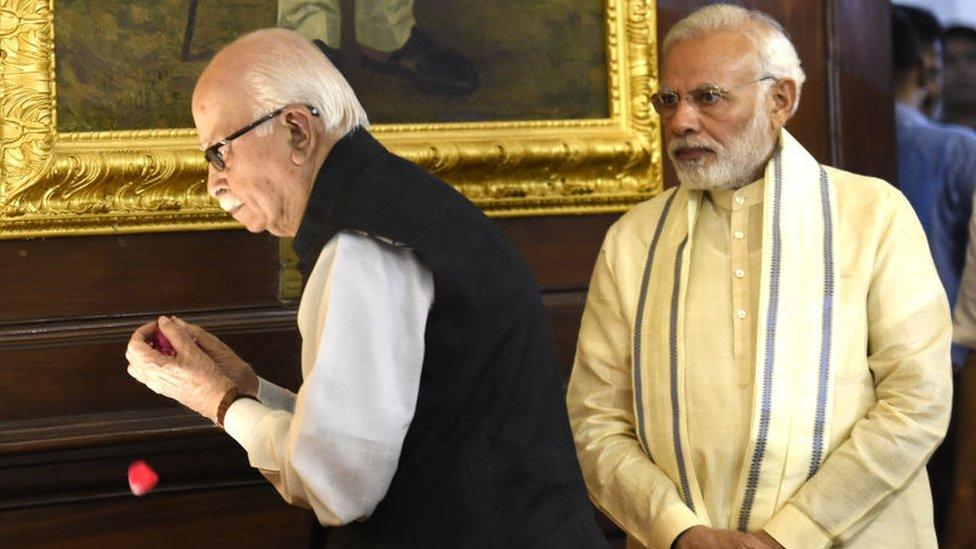
Mr Advani (L) helped promote Prime Minister Modi (R) years ago
India has entered full election mode: voting is due to begin on 11 April, with the final ballot cast more than five weeks later on 19 May. Every day, the BBC will be bringing you all the latest updates on the twists and turns of the world's largest democracy.
On Friday... A BJP veteran said the party must respect diversity
What happened?
One of the founders of India's governing Bharatiya Janata Party (BJP), LK Advani, has written a blog post that is being seen as a veiled critique of Prime Minister Narendra Modi.
In the post, the 91-year-old says that "the essence of Indian democracy is respect for diversity and freedom of expression".
He continues: "Right from its inception, the BJP has never regarded those who disagree with us politically as our 'enemies', but only as our adversaries. Similarly, in our conception of Indian nationalism, we have never regarded those who disagree with us politically as 'anti-national'."
Why does this matter?
Mr Modi and his supporters have frequently painted BJP opponents as anti-national and often suggest that they are working with Pakistan.
On Wednesday at a rally, Mr Modi said that the opposition Congress party was "hatching a conspiracy to destabilise the country", external and that its election manifesto was "a document of Pakistan's conspiracies".
Mr Advani is believed to be deeply upset at being sidelined in this election by BJP leaders whom he once strongly promoted, says the BBC's Nitin Srivastava. He was denied a ticket in Gujarat state - from where he has been elected to parliament six times.
The blog, our reporter says, appears to be a direct attack on Mr Modi and BJP President Amit Shah.
Mr Advani, an early advocate of the Hindu nationalist movement, called on his colleagues in the party to "look back, look ahead and look within".
Mr Modi quickly responded on Twitter, saying "Advani Ji perfectly sums up the true essence of BJP, most notably the guiding Mantra of 'Nation First, Party Next, Self Last.'"
Mr Advani himself is a controversial figure. He travelled across India in 1990, whipping up support for a campaign to build a temple on the site of a 16th Century mosque. Two years later, mobs destroyed the mosque.
In 2017, Mr Advani was charged with criminal conspiracy in relation to the mosque's demolition.

On Thursday... Yogi Adityanath landed in hot water
What happened?
India's Election Commission demanded that Uttar Pradesh Chief Minister Yogi Adityanath explain his reference to India's army as "Narendra Modi's army" - the remark could be deemed a violation of the election code.
The commission asked Mr Adityanath, a close ally of Prime Minister Modi, to respond by Thursday, an election official told The Hindu newspaper.
Mr Adityanath's comment, which he made at a BJP party rally on Sunday, drew criticism even from the candidate he had been campaigning for, retired Indian army chief and minister General VK Singh.
"If someone says that the Indian Army is Modi-ji's Army then not only is that person wrong but [he] is, in fact, a traitor," Gen Singh told BBC Hindi in an exclusive interview.
But he added: "This is a slip of tongue. I don't think he even realised what he said."
Why does this matter?
The Election Commission (EC) has previously issued an advisory that political parties and leaders must "exercise great caution while making any reference to the armed forces in their political campaigns".
So far it has just issued a "show cause notice" to Mr Adityanath - who will have to explain himself.
But it's unclear what action the EC could actually take if it is not satisfied with his response. Mr Adityanath, a firebrand Hindu priest, is a controversial figure..
Opposition parties demanded he apologise for the comments. Gen Singh is not the only retired general to have weighed in and emphasise that the army does not belong to any political party.
This is not the first time that the BJP has been accused of politicising the armed forces ahead of this election. Mr Modi has campaigned heavily on national security issues following recent hostilities between India and Pakistan.
Allow X content?
This article contains content provided by X. We ask for your permission before anything is loaded, as they may be using cookies and other technologies. You may want to read X’s cookie policy, external and privacy policy, external before accepting. To view this content choose ‘accept and continue’.



On Wednesday... questions were raised about WhatsApp's fake news checker
What happened?
WhatsApp launched a fact-checking service, where users can send in messages, photos and videos that they want verified. They will then be told if it's true, false, disputed or misleading.
The "checkpoint tipline", as it is known, is meant to counter fake news and misinformation ahead of India's general election.
The feature will be available in English and four Indian languages - Hindi, Telugu, Bengali and Malayalam.
WhatsApp is not the first to operate such a service. Indian fact-checking platforms AltNews and Boom already verify questionable content sent in by readers via WhatsApp. The BBC, via its various Indian language services, also fact-checks reports sent in by readers to identify misinformation.
But the messaging platform itself has now launched its own operation, with a little over a week to go until the first votes are cast, and questions are being raised over how effective it will be.
Why does this matter?
WhatsApp has been under scrutiny in India, where misinformation spread via the app has fuelled mob violence.
Facing pressure from the Indian government, the platform was forced last year to implement several features to curb fake news. It limited the number of times a message could be forwarded and marked such messages with a label so users were aware.
With an estimated 200 million users, India is WhatsApp's biggest market. It is also the most popular internet-based service in the country. This means it has tremendous reach, allowing messages to spread quickly and exponentially.
In recent years, WhatsApp in India has become notorious for viral and often unverified political messaging - text, photos and, most of all, videos that sometimes promote conspiracy theories and outright false information.
"This tipline will help create a database of rumours to study misinformation during elections," WhatsApp said in a statement.
However technology writer Prasanto K Roy said he believed the move would have little impact as most users exposed to "fake news" on WhatsApp would be unlikely to seek verification. But he said WhatsApp was under pressure "to demonstrate they are doing something" to counter the rampant spread of misinformation on the platform.
Earlier this week, Facebook - which owns WhatsApp - removed hundreds of accounts and pages linked to India's main opposition Congress party for "co-ordinated inauthentic behaviour". Many pro-government pages were also removed, according to reports, but Facebook did not mention these explicitly.
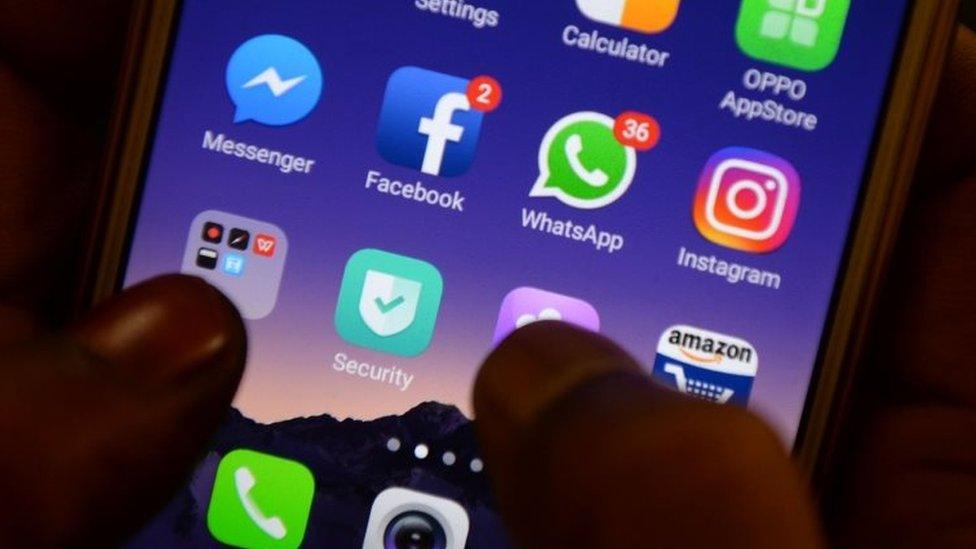
WhatsApp has released a new fact-checking feature ahead of the Indian election
On Tuesday... Congress promised to review a controversial anti-insurgent law
What happened?
India's main opposition party Congress promised to review the Armed Forces Special Powers Acts (AFSPA) if elected, according to its election manifesto.
The law allows troops to shoot to kill suspected militants or arrest them without a warrant.
It also protects soldiers who may kill a civilian by mistake or in unavoidable circumstances during an operation.
AFSPA has been blamed for "fake killings" in Indian-administered Kashmir and the north-eastern state of Manipur and campaigners say it is often misused.
The party also promised to scrap a contentious colonial-era law on sedition if it comes to power.
Why does this matter?
Critics, including human rights campaigners, have argued that AFSPA is undemocratic and has given the armed forces carte blanche power.
The law has always been seen as controversial, but it hasn't really been an election issue in years. In 2011, P Chidambaram, who was the home minister at the time, said he would review the law, sparking outrage from the opposition.
To some extent, it is a risky strategic move from the Congress - the governing Bharatiya Janata Party (BJP) has already criticised them, calling the idea "positively dangerous".
The announcement to amend the law came as analysts said that the BJP had begun to treat national security as an election issue after a suicide attack in Indian-administered Kashmir in which 40 Indian paramilitary were killed.
The manifesto also gives more details on the party's most ambitious welfare proposal - a basic income scheme that promises 72,000 rupees ($1050) yearly to India's poorest households.
Economists told the BBC that funding the scheme will require scrapping existing government subsidies on food and fertilisers, and removing certain tax incentives.
India's elections: Why you should care

And Yogi Adityanath drew criticism for a speech
What happened?
The chief minister of India's most populous state, Uttar Pradesh, drew fire from the opposition for referring to India's army as "Narendra Modi's army".
Yogi Adityanath - known for his fiery and controversial rhetoric - repeated a common accusation from the governing BJP party that the opposition Congress "used to serve terrorists biryani [a rice dish]" - an allegation stemming from rumours that 2008 Mumbai attacks gunman Mohammad Qasab was served biryani on Ramadan while he was in Indian custody.
He continued: "Modi ji's sena [army] gives them only 'golis' [bullets] and 'golas' [bombs]."
Why does it matter?
Mr Modi and the BJP are making national security their number one campaign issue ahead of the vote, continuously accusing the Congress of being weak on terrorism.
Various opposition leaders from across party lines called this comment from Mr Adityanath "an insult to our armed forces" and called on him to apologise.
A former Army Chief General, Shankar Roychowdhury, told NDTV that the Indian military serves "the government of the day, not a political party".
The comments from Mr Adityanath came a day after he was embroiled in another controversy. He travelled to a village where a Muslim man was lynched for allegedly eating beef, and addressed a rally where one of those accused of the murder was seated in the front row of the audience.
Mr Adityanath also indirectly referred to the incident, accusing the previous state government of "curbing the passion of Hindus" and adding that he had taken immediate steps to shut down slaughterhouses.
Hindus consider cows sacred and killing them is illegal in several states including Uttar Pradesh.

On Monday... Facebook removed hundreds of pages linked to the Congress party
What happened?
Facebook announced that it had removed more than 600 pages linked to India's main opposition Congress party.
"While the people behind this activity attempted to conceal their identities, our review found that it was connected to individuals associated with an INC (Indian National Congress) IT Cell," Nathaniel Gleicher, Head of Cybersecurity Policy at Facebook, said in a statement, quoted by the Reuters news agency.
A statement from the company also said it had removed 15 pages linked to Silver Touch, an Indian IT firm that has in the past been connected to the governing Bharatiya Janata Party (BJP).
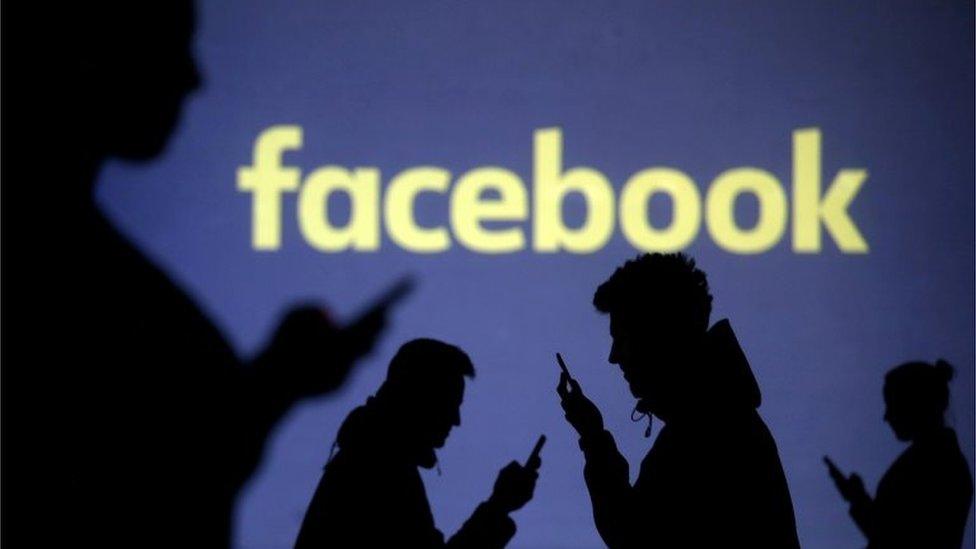
Why is this important?
Coming a day after Facebook CEO Mark Zuckerberg asked governments to do more to stop the spread of fake news, this move is intended to show that the social media platform is taking the problem seriously.
The fact that it has targeted so many pages belonging to the Congress is also significant from a political point of view. For one, the announcement has come days before the country begins voting in general elections on 11 April.
Secondly, the BJP is considered more social media savvy, and its supporters have often been linked to vicious trolling and slander against the party's critics and opponents.
Being called out so publicly is not only humiliating for the Congress, but also gives the BJP the moral high ground.
Prime Minister Narendra Modi has often said that he is being targeted in a campaign of hate by his political opponents and this is likely to help him buttress his claim.

And Rahul Gandhi took a gamble in the South
What happened?
India's main opposition Congress party announced that its president Rahul Gandhi would contest the general election from two seats.
Apart from his traditional constituency of Amethi in the northern state of Uttar Pradesh, Mr Gandhi will also now compete from Wayanad in the southern state of Kerala.
Congress leader AK Antony made the announcement on Sunday.
Why is this important?
"This is a message to the southern states that they are deeply valued and respected," Congress chief spokesperson Randeep told PTI news agency.
In what appeared to be a dig at governing BJP party, he added that this was "a fight" against "forces" that attacked and sought to divide "cultures, ways of life and the deep connect between north and south India".
Some analysts say this could also be part of a wider strategy to rejuvenate the party's base in the south, which has been dominated by regional parties for decades. Mr Gandhi has made several trips to the south in recent months and is seen as more popular in Tamil Nadu and Kerala than Prime Minister Narendra Modi and the BJP.
"Rahul Gandhi is actually trying to demonstrate that he - as a candidate poised to be the next prime minister of India - enjoys electability in both north and south India," Shashi Tharoor, Congress leader and MP from Kerala, said on Sunday. "It's a swipe at Narendra Modi, who we all know has absolutely no chance of winning in the south."
Wayanad is considered a "safe seat" for Congress.
BBC Hindi's Imran Qureshi says that the Congress already has a strong presence in the Wayanad constituency, adding that this was partly due to the high percentage of Muslims and Christians in the region.
"The Congress stand on women entering the Sabarimala temple, where they advocated for 'tradition' but still did not indulge in violence is also expected to help him here," he says.
Mr Gandhi's opponents speculate if this bid means he is unsure of actually winning his family stronghold, Amethi. In the 2014 general election, he won the seat despite a spirited campaign by BJP candidate Smriti Irani. But his margin of victory - which was a little over 100,000 votes - was seen as too close.
Ms Irani is set to contest from Amethi again.
In the Uttar Pradesh state assembly elections in 2017, the BJP won four out of five seats which fell under the Amethi constituency.

What happened last week?
You can read a full recap of everything that happened here.
But here are the highlights:
Much of the week was dominated by Prime Minister Narendra Modi's address to the nation on Wednesday when he announced that India had become an "established space power" after successfully destroying a low-orbit satellite in a missile test. The election commission said it would look into whether the speech violated its guidelines after opposition parties complained.
It started off on an ugly note. Uttar Pradesh chief minister Yogi Adityanath referred to an opposition Congress party candidate - a Muslim named Imran Masood - as the "son-in-law" of militant Masood Azhar. His comments were seen as a sign of the communal tone the campaigning is likely to take in UP, which sends the most number of MPs to parliament.
The week ended with the disqualification of Hardik Patel, a fiery social activist from Gujarat who rose to fame challenging Narendra Modi. Mr Patel was convicted of rioting in 2015 when he led mass caste protests in the state. He had joined the Congress party for this election, but needed a court to stay his conviction in order to contest. On Friday, the court refused.
The Congress promised "the world's largest minimum income scheme" if elected - a guaranteed basic income for 50 million of India's poorest families. But the BJP called it a "bluff" and accused the party of having "a terrible track record of poverty alleviation".
In other news, 236 farmers in the southern state of Telangana decided to contest from a single constituency to draw attention to India's deepening agrarian crisis; and police seized nearly 540 million rupees ($80m; £60m) worth of cash, alcohol, narcotics, gold and other valuables across India in poll-related inspections
Mr Modi kicked off his campaigning with a rally in Meerut and Priyanka Gandhi sparked a national conversation with a throwaway comment that she would contest the upcoming election if her party wanted her to. She was not named in the first list of candidates.
And finally, the producers of a film titled PM Narendra Modi denied that their movie was propaganda for the BJP and defended their decision to make it as "freedom of expression"

Coverage from previous weeks:


- Published10 April 2019
- Published2 April 2019
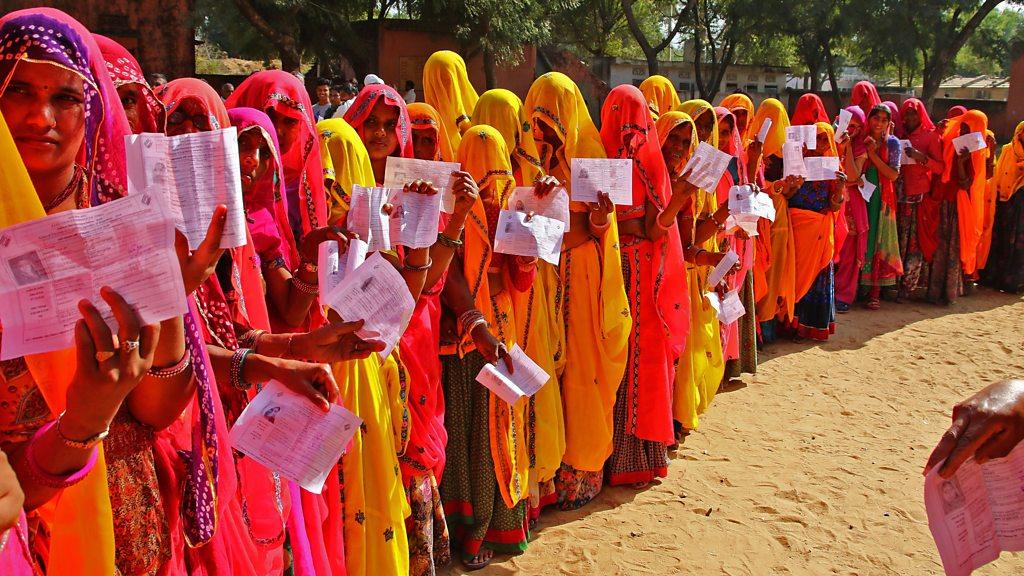
- Published22 May 2018
- Published8 June 2017
- Published18 March 2019
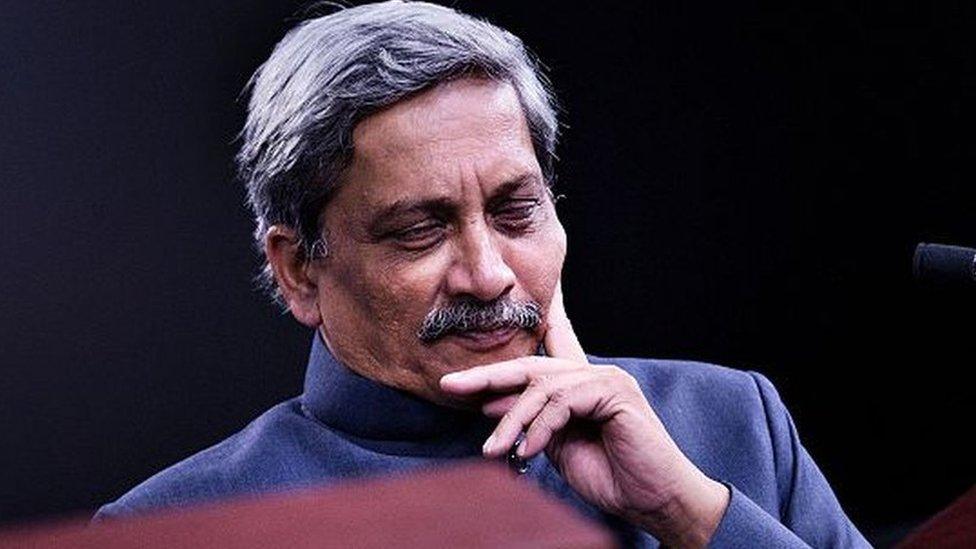
- Published12 December 2018